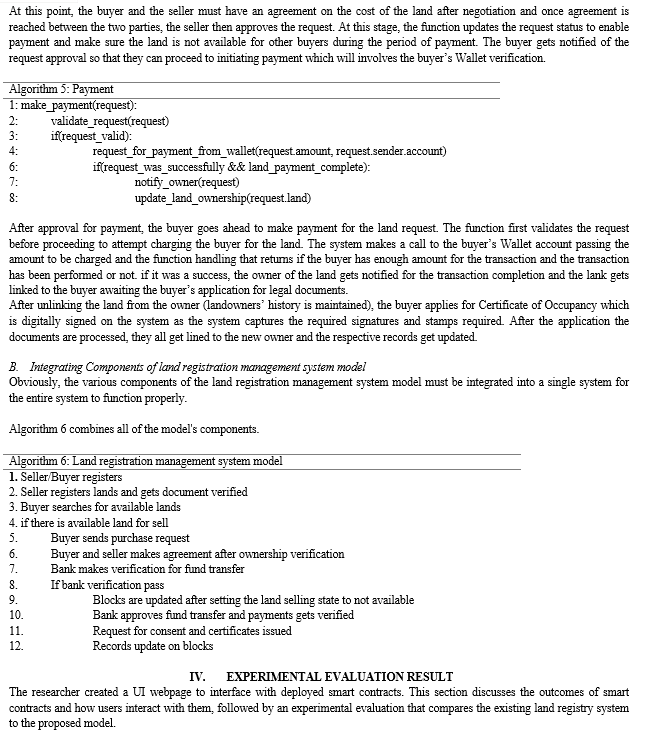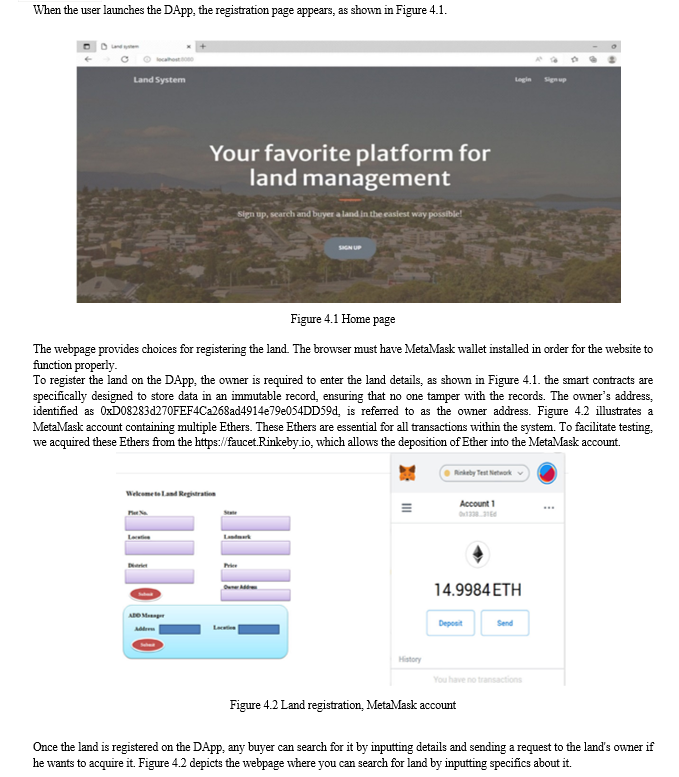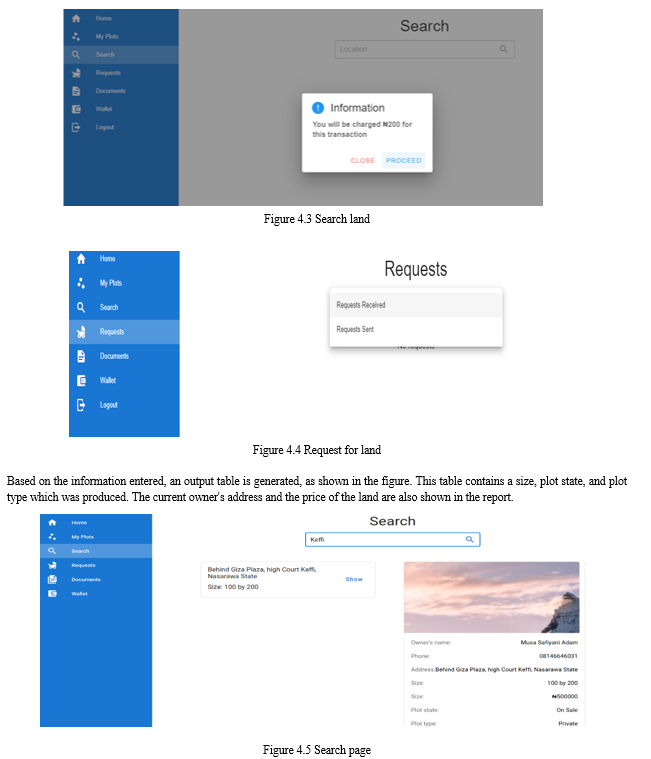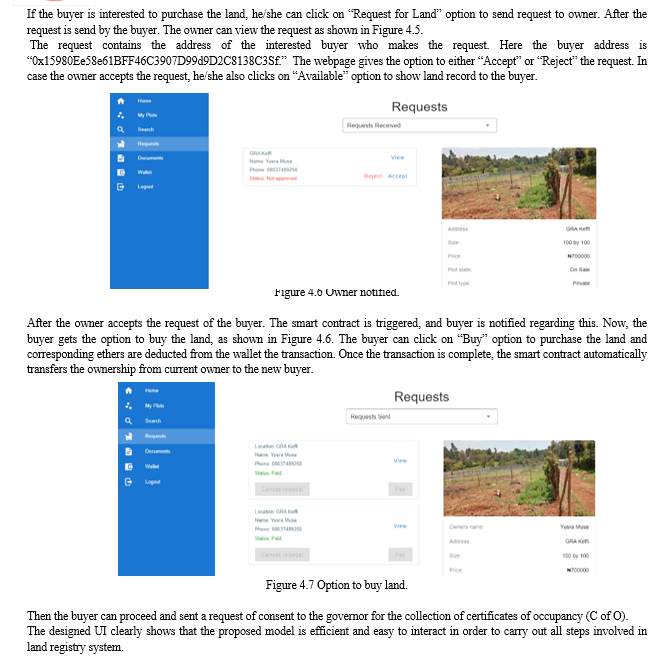Ijraset Journal For Research in Applied Science and Engineering Technology
- Home / Ijraset
- On This Page
- Abstract
- Introduction
- Conclusion
- References
- Copyright
Enhancing Land Registration through Blockchain Technology: A Comprehensive Analysis
Authors: Adam Musa Safiyanu, Yakubu Awal Jibrin, Abubakar Suleiman
DOI Link: https://doi.org/10.22214/ijraset.2023.56028
Certificate: View Certificate
Abstract
The ownership and verification of land are complex tasks involving multiple parties. This process is susceptible to fraud, as forged documents can mislead buyers, and disputes over land can lead to lengthy court battles, wasting time and resources. The current land registration process lacks clarity, prompting the need for technological integration, such as blockchain. Blockchain is a decentralized and transparent ledger that can address these challenges. This research proposes a land registration application system that utilizes blockchain technology and smart contracts. The system requires new buyers to register and proceed with the necessary procedures. The proposed model incorporates the SHA256 algorithm for generating unique hash values to secure messages stored in blocks, while Ethereum blockchain technology is utilized to store both smart contract and transaction details.
Introduction
I. INTRODUCTION
The management of land registration systems involves the recording of ownership details by government bodies. These records serve as proof of entitlement, preventing fraud and enabling smooth transitions when necessary. Outdated land records pose challenges in verifying land titles and can lead to fraudulent activities. Ensuring land entitlement is crucial for the social and economic well-being of citizens.
Additionally, secure and up-to-date land records assist governments in tax collection, service delivery, and other governance aspects. The World Bank is actively involved in supporting land registration system improvements in numerous countries through funding conferences and modernization projects. Government agencies are exploring secure, reliable, and tamper-proof digital systems for land records.
The complexity of the system arises due to the involvement of multiple stakeholders, requiring various checks and balances to address different types of threats and establish an environment of mutual trust. Blockchain-based solutions are well-suited for applications involving collaboration and transactions among entities with limited confidence in each other. Blockchain technology provides value in scenarios where information is shared across multiple systems or platforms.
II. RELATED WORKS
Several blockchain implementations in the field of land registry have been reviewed, with most of them in the initial or development stage, and some undergoing pilot testing.
Thakur conducted a comprehensive study on the existing land records management system in India, exploring how blockchain technology can enhance the current system and identifying key considerations for its implementation. While they propose a blockchain-based land titling system for India, they do not provide detailed descriptions of smart contract scenarios, public key infrastructure (PKI), or the type of architecture (public, private, hybrid) to be adopted.
Graglia and Mellon emphasize the importance of an incremental policy for the real-life adoption of blockchain [11], suggesting that simply migrating an old model to blockchain without a well-defined strategy is impractical. Mukne presents a land title management system for India utilizing a permissioned blockchain like Hyperledger Fabric and storing documents using the Interplanetary File System (IPFS).
The authors highlight the challenge of transitioning existing land records to the blockchain system. In Hasan and Salah, an Ethereum-based digital asset exchange system with a proof-of- delivery mechanism is proposed, incorporating a viable PKI model. The authors provide implementation details and algorithm models to replicate the proposed system [14].
Notable examples of blockchain-based land registration applications are observed in Brazil, Honduras, and Sweden. Factom, a US-based blockchain technology company, developed a blockchain-based land registration solution for Honduras, which aimed to prevent irregularities in land registration.
The Honduran government partnered with Factom to implement the blockchain system, which operated for three months starting in November 2015 [13].
Brazil, known for its 13-step ownership transfer process, has also adopted a blockchain-based land registration system. The Brazilian government chose to utilize blockchain technology to enhance accuracy, transparency, traceability, and security in transactions.
A solution developed by Ubiquity was implemented in Rio Grande do Sul Province in May 2017. Evaluation of the system's three-month operation revealed a decrease in recording system errors and significant improvements in archiving [15].
Most authors discuss the development of blockchain-based land registration or land titling management systems to reduce the number of physical documents, streamline processes, and minimize expenses.
Countries like Georgia aim to implement blockchain models to address corruption and mismanagement in land ownership registries. While the models are based on different countries' land registration systems, they often consider smart contract scenarios, payment methods for land purchases (full or partial), PKI, and the types of architecture (open, permissioned, consortium, or hybrid) to be adopted for implementation.
A. Current Challenges
Fraudulent activities have become prevalent in various transactions, including land transactions. Tracking property details such as ownership, land value, single or multiple ownership, and dispute issues poses significant challenges. The existing challenges in the present land registry are as follows:
- Increasing Number of Fraud Cases: Instances of individuals impersonating property sellers have been on the rise. Imposters can successfully deceive both sellers and buyers, leading to the imposter receiving the full payment and absconding with the funds. Many cases of fraud are only discovered during spot checks conducted by the land registry, leaving both parties unaware until then.
- Time Delays: Land registration processes often suffer from significant time delays. Completing the land registration can take several months, especially if the property is embroiled in litigation, resulting in lengthy court battles between parties.
- Lack of Traceability: In certain countries, traditional paper-based documentation only reveals the current owner of a property, providing no information about previous ownership history. This lack of traceability hinders the ability to ascertain the complete ownership lineage of a particular land parcel.
- Human error/intervention: Currently, updates to land registry records rely on manual entry, making them susceptible to human error. The accuracy of these changes depends on individual administrators, which introduces vulnerabilities in the land registry system.
These challenges underscore the need for improved mechanisms to address fraud prevention, streamline registration timelines, enhance traceability of ownership history, and minimize human errors through automated processes.
III. METHODOLOGY
The objective of implementing this methodology is to address fraud in land registration and ensure the security of transaction details. The primary issue in the existing system is the vulnerability to imposters, which prevents purchasers from obtaining accurate property information. To mitigate this problem, Ethereum blockchain technology is employed due to its transparency, immutability, and decentralized nature. The proposed methodology involves creating a land registry platform on the blockchain. All previously registered property details will be stored on a decentralized database, ensuring transparency. Prospective property buyers will have the ability to cross-verify comprehensive property information on this platform. Each land record will be stored as a block, and a digital title will be assigned to facilitate efficient searching. The SHA256 algorithm will be used to generate a unique hash value for each block. Users can search for properties using these digital titles within the land registry platform. Figure 3.1 provides an overview of the algorithm. The implementation of this methodology aims to enhance transparency, prevent fraud, and streamline the search process for property transactions. By leveraging the features of Ethereum blockchain technology, a secure and reliable land registry platform can be established, promoting trust and efficiency in land transactions.
A. Proposed Algorithm development
The algorithm for blockchain-based system model for land registration management has been refined based on the developed mathematical model.





Conclusion
This paper critically examined the existing procedures and challenges associated with traditional land registry systems. The traditional system is highly susceptible to tampering, leading to various integrity issues and incurring significant costs in terms of paper resources, storage requirements, and record keeping. The system\\\'s time-consuming nature further exacerbates problems, increasing the likelihood of bribery and double spending occurrences, where the same piece of land is sold to multiple buyers simultaneously. These issues have detrimental effects on the economy, discouraging investments in land trading and hindering overall country growth. Furthermore, they impact government tax collection and contribute to the proliferation of unaccounted properties, resulting in an increase in black money. In light of these challenges, blockchain technology emerges as a promising solution. This paper has proposed a framework for a secure and reliable land registry system, addressing key issues such as tampering and double spending while enabling near real-time updates of land records. The proposed system offers significant economic benefits, requiring fewer human resources and offering improved reliability. Additionally, the paper introduces an algorithm for a pre-agreement contract between buyers and sellers, enhancing the efficiency of the ownership record generation and updating processes across various interconnected nodes (offices). Moving forward, the proposed framework and algorithm hold potential for implementation in real-world environments. By leveraging the power of blockchain technology, a more robust and transparent land registry system can be established, fostering trust, facilitating economic growth, and addressing the challenges associated with traditional land registry systems.
References
[1] Liu, X., Chen, R., Chen, Y. W., & Yuan, S. M. (2018, November). Off-chain data fetching architecture for Ethereum smart contract. In 2018 International Conference on Cloud Computing, Big Data and Blockchain (ICCBB) (pp. 1-4). IEEE. [2] Jaoude, J. A., &Saade, R. (2019). Business Applications of Blockchain Technology-A Systematic Review. IEEE Access. [3] Nandi, M., Bhattacharjee, R. K., Jha, A., &Barbhuiya, F. A. (2020). A secured land registration framework on Blockchain. In 2020 Third ISEA Conference on Security and Privacy (ISEA-ISAP) (pp. 130-138). IEEE. [4] Leka, E., Selimi, B., &Lamani, L. (2019, September). Systematic literature review of blockchain applications: Smart contracts. In 2019 International Conference on Information Technologies (InfoTech) (pp. 1-3). IEEE. [5] Zheng, W., Zheng, Z., Chen, X., Dai, K., Li, P., & Chen, R. (2019). Nutbaas: A blockchainas-a-service platform. Ieee Access, 7, 134422-134433. [6] Chen, J., Cai, T., He, W., Chen, L., Zhao, G., Zou, W., &Guo, L. (2020). A blockchain-driven supply chain finance application for the auto retail industry. Entropy, 22(1), 95. [7] Halpin, H., &Piekarska, M. (2017, April). Introduction to Security and Privacy on the Blockchain. In 2017 IEEE European Symposium on Security and Privacy Workshops (EuroS&PW) (pp. 1-3). IEEE. [8] Sekhari, A., Chatterjee, R., Dwivedi, R., Negi, R., & Shukla, S. (2019). Entangled blockchain in land registry management. BW3, India. [9] Hu, Y., Liyanage, M., Mansoor, A., Thilakarathna, K., Jourjon, G., &Seneviratne, A. (2018). Blockchain-based smart contracts-applications and challenges. arXiv preprint arXiv:1810.04699. [10] Thakur, V., Doja, M. N., Dwivedi, Y. K., Ahmad, T., & Khadanga, G. (2020). Land records on blockchain for implementation of land titling in India. International Journal of Information Management, 52, 101940. [11] Lemieux, V. L. (2017). Evaluating the use of blockchain in land transactions: An archival science perspective. European property law journal, 6(3), 392-440. [12] Graglia, J. M., & Mellon, C. (2018). Blockchain and property in 2018: At the end of the beginning. Innovations: Technology, Governance, Globalization, 12(1-2), 90-116. [13] Hasan, H. R., & Salah, K. (2018, June). Blockchain-based solution for proof of delivery of physical assets. In International Conference on Blockchain (pp. 139-152). Springer, Cham. [14] Mukne, H., Pai, P., Raut, S., & Ambawade, D. (2019, July). Land Record Management using Hyperledger Fabric and IPFS. In 2019 10th International Conference on Computing, Communication and Networking Technologies (ICCCNT) (pp. 1-8). IEEE. [15] Abhishek, G. (2019). Property Registration and Land Record Management via Blockchains. Diss. Indian Institute of Technology Kanpur.
Copyright
Copyright © 2023 Adam Musa Safiyanu, Yakubu Awal Jibrin, Abubakar Suleiman. This is an open access article distributed under the Creative Commons Attribution License, which permits unrestricted use, distribution, and reproduction in any medium, provided the original work is properly cited.

Download Paper
Paper Id : IJRASET56028
Publish Date : 2023-10-05
ISSN : 2321-9653
Publisher Name : IJRASET
DOI Link : Click Here
 Submit Paper Online
Submit Paper Online

